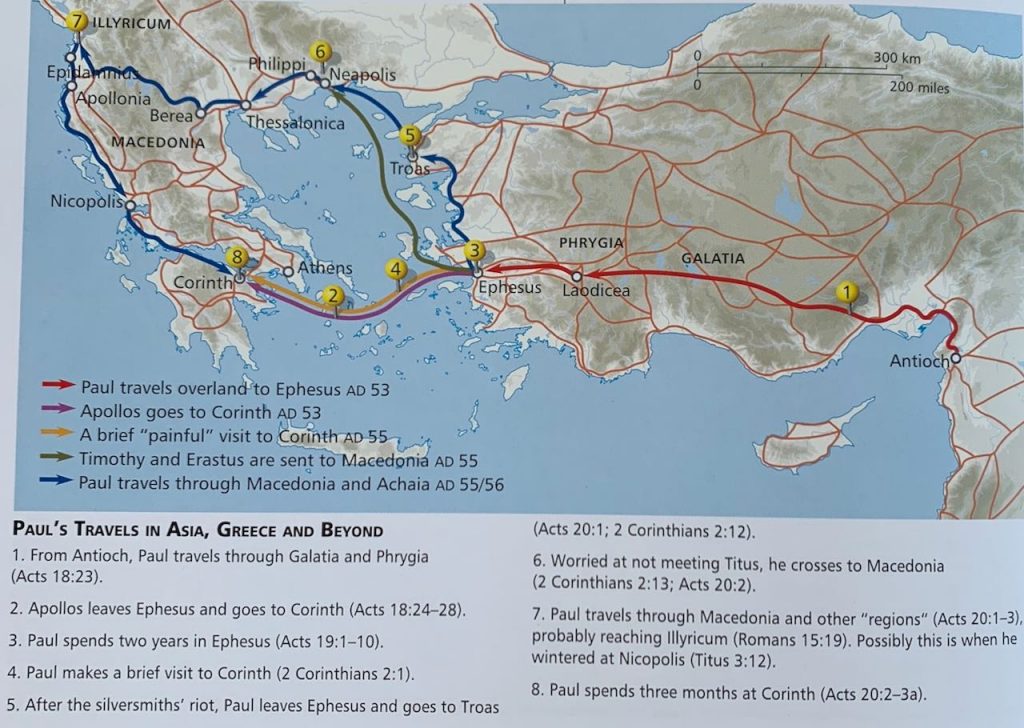Paul stayed in Corinth for some time after that, then said good-bye to the brothers and sisters and went to nearby Cenchrea. There he shaved his head according to Jewish custom, marking the end of a vow. Then he set sail for Syria, taking Priscilla and Aquila with him. They stopped first at the port of Ephesus, where Paul left the others behind. While he was there, he went to the synagogue to reason with the Jews. They asked him to stay longer, but he declined. As he left, however, he said, “I will come back later, God willing.” Then he set sail from Ephesus. The next stop was at the port of Caesarea. From there he went up and visited the church at Jerusalem and then went back to Antioch. After spending some time in Antioch, Paul went back through Galatia and Phrygia, visiting and strengthening all the believers.
Acts 18:18-23
Meanwhile, a Jew named Apollos, an eloquent speaker who knew the Scriptures well, had arrived in Ephesus from Alexandria in Egypt. He had been taught the way of the Lord, and he taught others about Jesus with an enthusiastic spirit and with accuracy. However, he knew only about John’s baptism. When Priscilla and Aquila heard him preaching boldly in the synagogue, they took him aside and explained the way of God even more accurately. Apollos had been thinking about going to Achaia, and the brothers and sisters in Ephesus encouraged him to go. They wrote to the believers in Achaia, asking them to welcome him. When he arrived there, he proved to be of great benefit to those who, by God’s grace, had believed. He refuted the Jews with powerful arguments in public debate. Using the Scriptures, he explained to them that Jesus was the Messiah.
Acts 18:24-28
As I have indicated to you before, Luke’s account of Paul’s travels after he left Corinth to the time when he returned to Antioch was extensive but light on details. If his prime reason was to go to the temple in Jerusalem, what Paul did there was not spelled out by Luke. Rather he makes a brief stop in Jerusalem and then on to Antioch. Why does he spend “some time” in Antioch? Simply because Antioch was Paul’s sending church. Remember Antioch was the church which commissioned Paul and Barnabas to the work when they were told by the Holy Spirit to set Barnabas and Paul apart for the work God had for them. It seems so long ago since we were camped in Antioch. When Barnabas was number one and Paul was his helper. That was back in Gem 1607, one hundred and forty seven Gems ago. Much has happened since then, many changes in personnel and a change in Paul’s focus from Jews to Gentiles.

You can see from the map that Paul travels a huge number of kilometres to get back from Achaia to Antioch via Jerusalem. Notice that this map doesn’t even include Jerusalem despite the fact that Paul stopped there. The focus was Antioch and from there back to Galatia and Phrygia. Paul’s journeys around Asia Minor and Macedonia and Achaia were extensive and mostly on foot. His commitment to taking the Good News of Christ was strong enough to motivate him to visit these places numerous times not just once.
Notice he stops in to reason with the Ephesian Jews despite the fact that he has shaken the dust off and moved on to the Gentiles. Yet he doesn’t stay there long at all, telling them, God willing, he would be back. Do you notice a glaring error in this map which is supposedly tracking Paul’s journeys as laid out in Acts 18-20 and attempting to account for the movements of Paul as indicated in the Corinthian letters?
While Paul moves to Galatia and Phrygia, Luke takes us back to Ephesus, where we find Apollos filling in for Paul in his absence. Take some time to find out what you can about Apollos and examine this fascinating short account of Apollos’ time in Ephesus which Luke gives us. This should raise and number of questions. It also brings us to the chapter boundary. You know what to do when we reach a chapter boundary.
Sometimes people don’t want to hear the truth because they don’t want their illusions destroyed.
Friedrich Nietzsche
The size of your life is in direct proportion to how uncomfortable you’re willing to be?
Rick Godwin
Envy is an admission that you understand you are living beneath your potential and not willing to do anything about it?
Rick Godwin
God will send you a replacement when you’re not afraid to lose what He’s replacing!
Ian Vail
